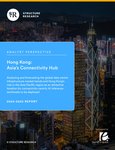Sharing is hard. It’s one of the first things you learn as a child, and for most people it’s something that doesn’t come naturally.
While, on a human level, most of us eventually figure it out – we let our peers have a few of our Skittles on the playground – it isn’t a universal value. It also isn’t business.
According to Synergy Research Group, the cloud computing market was worth $330 billion in 2024. For comparison, Finland’s GDP in 2023 was $295 billion.
Within this enormous market, only three companies have a meaningful position: Microsoft, Google, and Amazon through its Amazon Web Services (AWS) business.
That same Synergy Research paper said that Amazon held a 30 percent market share, Microsoft 21 percent, and Google 12 percent, coming to a cumulative 63 percent.
The remaining 37 percent is split between all remaining companies – the well-established competitors like Oracle, OVHcloud, and IBM, and the Neocloud providers like CoreWeave, all the way down to the small cloud companies starting up with regional offerings.
The hyperscale trio’s dominance hasn’t gone unnoticed, and in the US the Federal Trade Commission has reportedly been investigating Microsoft’s alleged anticompetitive practices, though this has never been confirmed by the government department.
Elsewhere, regulatory action is very much a reality.
Both in Europe, after a complaint lodged by CISPE (Cloud Infrastructure Services Providers in Europe) to the European Commission about Microsoft’s licensing practises, and the UK, where competition watchdog the Competitions and Markets Authority (CMA) is look at the overall cloud services market, tangible efforts have been made to curb the dominance of the three US hyperscalers.
Thus far, however, it seems to be to little avail.
Part of the reason the issue of competition has been taken more seriously in Europe than the US is a distinct unease with the idea of putting European data into the care and responsibility of American companies, but perhaps more importantly, the idea of giving money to companies that could instead be going to domestic cloud providers.
Last year, DCD spoke to Francesco Bonfiglio, former CEO of Gaia-X, an organization campaigning for federated and secure data infrastructure in Europe, about the current market share in Europe. His perspective was less than optimistic.
“We have three years,” Bonfiglio told DCD at the time. “In 2017, we [European cloud providers] had 26 percent of the market share, now we are at 10 percent. We can’t turn that back, so in three years it will be zero. Meanwhile, you have American providers buying data centers and gigawatts of energy.”
“My question is, what’s the value in having digital regulation if there is no digital market to regulate?”
The basis for concern about competition was summed up to DCD by Vultr’s Kevin Cochrane.
“There are a few primary problems. Number one is that the hyperscalers leverage free credits to get digital startups to build their entire stack on their cloud services,” Cochrane says, adding that as the startups grow, the technical requirements from hyperscalers leave them tied to that provider.
“The second thing is also in the relationship they have with enterprises. They say, ‘Hey, we project you will have a $250 million cloud bill, we are going to give you a discount.’ Then, because the enterprise has a contractual vehicle, there’s a mad rush to use as much of the hyperscalers compute as possible because you either lose it or use it.
“At the end of the day, it’s like the roach motel. You can check in, but you can’t check out,” he sums up.
Mainland Europe’s woes
The issue of anticompetitive practices in the cloud market has been in discussion for years at this point, but it wasn’t until 2022 that two European providers – Aruba and OVHcloud, officially lodged a complaint to the European Commission, specifically focused on Microsoft.
CISPE, of which AWS was a member at the time, backed that complaint.
CISPE has been operating since 2015 but was officially registered in 2017. The trade association campaigns for a EU-wide cloud-first public procurement policy and for fairness across the industry, including software licensing practices and avoiding vendor lock-in. Microsoft has frequently been singled out in discussions about competition in the cloud market for its software licensing practices.
CISPE itself officially filed a complaint against Microsoft in November 2023 alleging that the cloud provider had unfair licensing practices. In a press release about the filing, CISPE wrote: “Microsoft’s ongoing position and behaviours are irreparably damaging the European cloud ecosystem and depriving European customers of choice in their cloud deployments. CISPE feels it has no option but to become a formal complainant and to urge the European Commission to act.”
Microsoft has not responded to any requests from DCD for comment or an interview to discuss competition in the cloud market.
DCD spoke with CISPE’s director of communications Ben Maynard recently at a Data Center Nation event in Milan, Italy. Against the backdrop of the conference room hum, Maynard explained a bit more about the whole process, from inception to date.
“We launched our complaints against Microsoft with the European Commission in November 2022, and that was driven by a number of members – particularly those in mainland Europe – who felt that it was getting increasingly hard to compete with Microsoft because everyone wants to use Microsoft software, and its easier and cheaper to buy if it runs in Azure.
“We did a lot of work, and commissioned some research that showed what this was actually costing the European economy,” Maynard tells DCD.
The research in question is likely that released in June 2023 by Professor Frédéric Jenny, which found that “additional charges levied on those choosing a non-Microsoft cloud when using the Microsft SQL Server software sucked an additional €1.01 billion ($1.13bn) out of the European economy in 2022.”
Microsoft itself has previously conceded some wrongdoing. President and vice chair of Microsoft, Brad Smith, was reported by the Financial Times in 2021 as saying in a statement: “While not all of these claims are valid, some of them are, and we’ll absolutely make changes soon to address them.”
Microsoft, he added, was “committed to listening to our customers and meeting the needs of European cloud providers.” Maynard tells DCD that this sentiment was shared in CISPE’s communications with Microsoft, with the cloud giant telling CISPE that they wanted to find some kind of solution.
“We spent a year negotiating with them on what a solution could look like. And they presented a solution to us in late spring/early summer 2024, we shared that with members who thought it was, on balance, worth giving them the benefit of the doubt.”
It was in July 2024 that Microsoft and CISPE officially came to an agreement. That agreement saw Microsoft paying €20 million ($21.7m) to CISPE members in return for the complaint to be withdrawn, as well as to develop a product – Azure Stack HCI for European cloud providers (Hosters) – that enables CISPE’s members to run Microsoft software on their platforms at equivalent prices to Microsoft’s.
The company also agreed to compensate CISPE members for lost revenues related to their licensing costs for the last two years.
While Maynard explains that this was a decision that was made by the association – and thus voted for by a majority of the members – it was not universally popular.
Dissatisfied competitors
AWS spokesperson Alia Ilyas said that Microsoft was only making “limited concessions for some CISPE members that demonstrate there are no technical barriers preventing it from doing what’s right for every cloud customer.” Ilyas added that it would “nothing for the vast majority of Microsoft customers who are still unable to use the cloud of their choice in Europe and around the world.”
AWS is and was a member of CISPE.
Amit Zavery, head of platform at Google Cloud, added: “Many regulatory bodies have opened inquiries into Microsoft’s licensing practices, and we are hopeful there will be remedies to protect the cloud market from Microsoft’s anti competitive behavior.
“We are exploring our options to continue to fight against Microsoft’s anti competitive licensing in order to promote choice, innovation, and the growth of the digital economy in Europe.”
Mark Boost, CEO of UK cloud company Civo, said: ”However they position it, we cannot shy away from what this deal appears to be: a global powerful company paying for the silence of a trade body, and avoiding having to make fundamental changes to their software licensing practices on a global basis.”
In the months that followed this decision, things got interesting.
Reports emerged that Google offered CISPE €14 million ($15.3m) in cash and €455m ($497.5m) in software licenses on the basis that CISPE continue its antitrust case. AWS reportedly contributed €6m ($6.56m).
This has not been confirmed by either Google or CISPE, but the reports originally from Bloomberg cited “confidential documents.” Around the same time, the Register reported that Google was similarly considering joining the trade association.
Sources with knowledge of Google have spoken to DCD about the topic. While unable to comment on the alleged “offering” to CISPE, noted that Google had asked CISPE to stick to the “Fair Software Licensing Principles” that they had agreed to uphold.
“Google heard that they were entertaining a proposal from Microsoft that would require CISPE to violate its own standards and principles, and Google made clear they would only join if CISPE would hold true to its principles,” the source told DCD.
The principles detailed by CISPE that are pertinent to this include: “Customers that seek to migrate their software from on-premises to the cloud should not be required to purchase separate, duplicative licences for the same software,” that “Licences that permit customers to run software on their own hardware (typically referred to as “on-premises” software) should also permit them to use that software on the cloud of the customer’s choice without additional restrictions,” and also “Software vendors should not penalize or retaliate against customers who choose to use those vendors’ software on other providers’ cloud offerings,” which includes charging more for licensing fees.
Regardless of complaint or attempted intervention, CISPE and Microsoft settled.
Part of the agreement required Microsoft to develop a product that would seemingly satisfy these software licensing issues. At the time it was called HCI Stack for Hosters, but has since been rebranded as Azure Local.
To monitor this, CISPE established the European Cloud Competition Observatory (ECCO). Interestingly, while managed by CISPE and governed independently, CISPE notes of ECCO that “technical experts contribute as needed, and Microsoft participates in the initiative.”
As of February 2025, Microsoft was awarded an “Amber” status on its progress with the project in its first report. “There were some things that they had done really well,” says Maynard. They had started a beta program. They’ve got people onboarded. People were trying the product. They had delivered some of the easier things to do in the settlement. They had given us money to recompense for the amount of time and effort we spent, and they had given some money to the members as well.
ECCO went to Redmond, Washington, in December 2024 to view Azure Local. “It did some things, but it didn’t do all the things it needed to do,” admits Maynard.
As to the reason behind the delay, Maynard said: “I think it’s legitimately technically challenging. The thing we really need is multi-tenancy. As a hoster, you want to be able to host as many customers on one hardware infrastructure as you can. Azure Local doesn’t really do a good job of that. It’s not built for that. To a certain extent, it’s trying to fit a round peg into a square hole.
“I don’t think there’s any dragging of feet, I think it’s just more challenging than they thought it would be.”
In May 2025, CISPE ruled that the product Microsoft was proposing failed to meet its requirements, giving the cloud company two months to formally propose an alternative, effectively bringing the process back to the beginning again.
As previously noted, the compensation Microsoft paid out didn’t go to the large cloud providers, despite AWS being a member of CISPE.
This is entirely logical. With an even bigger market share for cloud than Microsoft, AWS hardly needed recompense. But it raises the question of whether hyperscalers even should be involved and have a vote in matters of competition.
DCD spoke to several companies in the industry – and members of CISPE – about this very topic.
CISPE itself actually restructured its organization to become a “fully European governance structure,” which meant that only European companies could hold board positions and thus vote on decisions.
That restructuring occurred in February of this year, meaning that up till that point, members like AWS did have a vote on decisions.
Hyve Managed Hosting, an IT Services provider and member of CISPE, director Jake Madders says to DCD: “We’re trying to be very fair and open, but I mean, they’re not voting members. They’re not going to govern what’s happening.
“But they are open to listening and being a part of these meetings, and at the end of the day, we want them to help and understand our problem. It’s human beings listening to human beings.”
This was reiterated, though with caveats, by Vultr’s Kevin Cochrane, CMO of Vultr, a privately held cloud company and also a member of CISPE.
“It’s a challenging question,” agrees Cochrane. “On the one hand, we need to gather everyone together to start a community-led process, but we need to make sure the waters are not poisoned and thus maybe should exclude those market-dominating players.
“On the other hand, there are good people who work in those companies, and they are smart people. You could probably talk to someone from Microsoft; an individual may have perspectives that are very much in line with what we’re talking about right now, and anytime you exclude a voice from the table, you’re limiting the conversation and potentially having a worse outcome,” he says.
Overall, Cochrane says he is “optimistic” and is ultimately a “big proponent of bringing everyone together.”
Finger-pointing and backstabbing
In October 2024 – around four months after CISPE and Microsoft settled – a new group entered the scene: the Open Cloud Coalition (OCC), a UK group.
The OCC describes itself as an alliance of leading cloud providers and users that aims to improve competition, transparency, and resilience within the cloud industry, and launched with ten members: Centerprise International, Civo, Gigas, Google Cloud, and domestic companies such as ControlPlane, DTP Group, Prolinx, Pulsant, Clairo, and Room 101.
At the time of writing, the OCC’s website lists 21 members. Google remains the only one of the “Big Three” to join, while AWS and Microsoft remain members of CISPE, of which Google is not a member.
The OCC officially launched on October 29. The day before – October 28 – Microsoft released a blog post penned by CVP and deputy general counsel Rima Alaily said that the OCC was “an astroturf group” and that it was designed to “discredit Microsoft with competition authorities, and policymakers and mislead the public,” and that Google has attempted to “obfuscate its involvement” in OCC.
Alaily suggested that Google recruited European cloud providers to serve as the public face of the organization, while Google will “present itself as a backseat member rather than its leader. “It remains to be seen what Google offered smaller companies to join, either in terms of cash or discounts,” Alaily added.
OCC’s spokesperson Nicky Stewart vehemently denied these claims to DCD.
“Conversations about forming a coalition in the UK had been going on very loosely and informally for a couple of years,” Stewart says, when asked if the group was a response to the CISPE settlement.
“Informally because when it came to it, it was a question of ‘put your head over the parapet or your hand in your pocket,’ and those in discussions would get stunningly silent,” she adds.
“Over the parapet because most of the smaller cloud providers actually have commercial relationships with the hyperscalers. And in terms of the financial side of things, smaller companies are smaller companies, and they don’t have unlimited resources to fund this kind of thing.”
On the topic of whether Google was paying or giving companies incentives to join the OCC, Stewart says: “That is absolute rubbish.” Beyond Stewart’s assertions that Microsoft’s framing of the OCC’s founding are unfounded, the key description of the group as a “shadow campaign” remains somewhat laughable.
Shadow campaign suggests secret movements, but with Google’s name listed front and center – literally in the first two sentences of the launch’s press release – there is clearly no attempt to obfuscate their involvement.
At the time of Alaily’s blog post, a Google spokesperson responded: “We’ve been very public about our concerns with Microsoft’s cloud licensing. We and many others believe that Microsoft’s anticompetitive practices lock in customers and create negative downstream effects that impact cybersecurity, innovation, and choice. You can read more in our many blog posts on these issues,” and included links to said blogs.
Google additionally publicly filed a complaint, similar to that withdrawn by CISPE, with the European Commission in September 2024, though any progress on that effort is unknown.
The OCC has, thus far, focused on the ongoing CMA’s “Cloud services market investigation” in the UK, which is evaluating the state of the sector, and whether it is currently fair.
“One of our first acts was to jump in a put a response in to the CMA,” Stewart tells DCD. “There’s a whole load of issues here, and can the OCC boil the ocean? Well, no, it can’t. It’s got to work out where it’s best placed and where it can make the biggest difference.”
The CMA investigation was launched in October 2023 following a recommendation from the UK’s communications regulator, Ofcom.
Ofcom found at that time that AWS and Microsoft had a combined share of 70 to 80 percent of Britain’s public cloud market in 2022, while Google was the closest competitor with five to 10 percent.
Since the launch of that investigation, all three US hyperscalers removed egress fees for those looking to fully leave the cloud in an attempt to improve competition.
After more than a year of investigation, and extending the deadline of its final outcome to August of this year, the CMA released provisional findings in January 2025.
That summary document noted AWS and Microsoft’s dominant market share, their ability to invest more in data centers and servers, lower ongoing costs due to economies of scale, and dedicated a large section to Microsoft’s software licensing practices, which it said had the potential to harm its rival.
Both AWS and Microsoft were recommended for further investigation to see if they should receive a “strategic market status” designation. Should they be labeled as such, they could face conduct and reporting requirements.
DCD reached out to AWS for an interview for this article, but the company said it was unable to provide an interviewee.
But, as is to be expected, both AWS and Microsoft hit back at these findings.
Microsoft complained it was being singled out, and that the CMA was using “hypothetical scenarios” not evidence for its decision. The company wrote in response: “While AWS clearly believes it is entitled to license all of Microsoft’s software for its own benefit and on favorable terms (even though AWS provides none of its own software to Microsoft or anyone else), it has not, to our knowledge, complained about an inability to compete effectively. Nor could it.”
The response further draws attention to Google Cloud’s successful growth, arguing that “with results like that, it bears reflecting whether the CMA must intervene to enable Google’s growth in the UK market by softening competition from its competitors.”
AWS disputed that its own behavior is anti-competitive, but agreed with complaints about Microsoft’s software licensing
Google, meanwhile, “strongly agree[s] with the CMA’s finding that Microsoft’s software licensing practices are giving rise to an adverse effect on competition,” and said that it “broadly support[s] the package of remedies that the CMA recommends,” though disagrees with proposed remedies on egress fees.
Who is really hurting?
Overall, it can’t help but seem like the whole process has lost sight of what it is really about. With each response submission from the hyperscalers, one recalls the now popularized “Spider-Man pointing” meme; each hyperscale one of three separate but identical ‘Spider-Men’ pointing at each other as though to shift the blame.
The real victims of a cloud market lacking in competition are not AWS and Google. In the most recent quarter, Google’s cloud business pulled in $12.3 billion globally. AWS raked in $29.3bn.
Particularly in the UK, a good place to look to understand the gravity of the problem is in government procurement.
It is hard to actually quantify how much the UK government has spent with US hyperscalers over the years, due to the sheer quantity of contracts and extensions, but at this point in the past 10 years, it is certainly in the billions.
Hyve Managed Hosting’s Madders described the spend as “absolutely bonkers.”
He says: “Why would the UK Government be spending billions on hosting services provided by AWS, when we have companies like Hyve in the industry and the market that are based in the UK?”
Madders later added: “We are trying to create a regulation where they need to at least give us a chance to compete, rather than just steering straight to the US hyperscalers. Even if we had one percent of the hosting contracts, it would make a huge difference to us, and very little difference to them.”
OCC’s Nicky Stewart is similarly frustrated by the reality, warning DCD that she would “go slightly on a hobby horse here,” in particular when discussing the uncomfortable reality that just last year, the CMA itself doubled spend on AWS.
“The UK government entered into MoUs with the big cloud providers, essentially asking for preferential pricing. The CMA has looked into this, specifically at preferential pricing that increased as volume increased.
Stewart continues: “The CMA itself had already gone into a preferential pricing deal that came to an end, and they renewed it for a further three years. Even though it was being investigated by the CMA, I suspect they couldn’t afford to not increase it. The contracts were subsequently published because of transparency rules, and most of them had doubled.
“At the end of the next three years, what’s going to happen then? In all probability, unless money trees suddenly sprout up, they will need to be renewed again.”
To lay things out clearly, the people impacted by a government’s potentially wasteful spending are the taxpayers of that country. The people who benefit from the current system are the tech oligarchs holding the contracts.
The UK’s government procurement for cloud services is done through the G-Cloud framework, though according to Hyve’s Madders, it is mostly ineffective.
“We’ve been on G-Cloud for many years. It’s very hard to win any business on there. It hasn’t really worked as a marketplace. They don’t really use it to find you as a supplier, or at least, that’s what our experience has been,” he says, though he adds that “We probably haven’t been leveraging it as well as we should be.”
“You can find tenders in there, and there are ways of seeing what’s available, but it’s very difficult to compete – especially on paper. There are questions like ‘What’s your turnover?’ and when that is versus Amazon’s turnover – if they are using that as a gauge to choose you – forget it.”
The ultimate findings of the CMA are due for publication in August 2025, though even if it finds issues with business practices, the process of actually making marked change will be slow and painful.
We can only hope that these investigations will begin the process of working towards a fairer market, one where “sharing” extends to all, not just the elite few.
Read the orginal article: https://www.datacenterdynamics.com/en/analysis/fighting-in-a-cloudy-arena/











